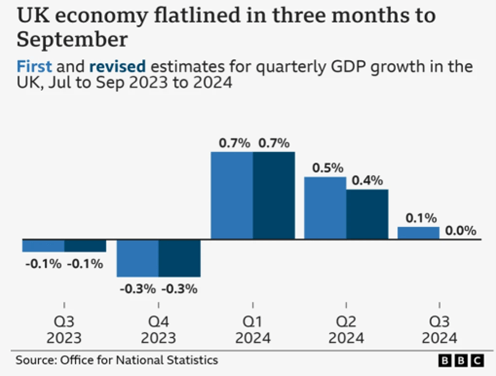New revised figures showed that the UK economy flatlined in the third quarter of the year, showing the UK had some of the lowest economic growth of the G7.
The Office for National Statistics (ONS) has come out with revised figures showing that the UK economy had no growth from July to September last year.
This came after legal services, firms, bars, restaurants and other companies reported a weaker than expected performance during the UK summertime – if you can call that a summer.
Liz McKeown, the Director of economic statistics stated that ‘The household saving ratio fell a little in the latest period, though remains relatively high by historic standards.’
‘Meanwhile, real household disposable income per head showed no growth,’ she added.
Previous estimates for July and September said the economy grew by a ‘whopping’ 0.1%.
Early figures suggested that the GDP per head fell by 0.2% in the third quarter last year, which was 0.2% lower than the same quarter in 2023.
This has created caution within the UK business world, with many concerned the downward slope may steepen throughout 2025.
A CBI survey of over 900 participants suggested that private sector businesses across the country are likely to have a ‘steep decline in activity’ in the first few months of 2025.
This underscores the United Kingdom’s financial weakness in the international picture, with Italy and the UK both flatling in the third quarter.
Italy historically has had a poor economy, as seen during Transformismo politics, their 20th century north and south divide and their agricultural struggle. But now the UK is reluctantly following their footsteps.

This has concerned the nation’s Labour government, who have already faced immense backlash on their financial plan.
Chancellor Rachel Reeves has stated that she has a ‘huge’ task to better the economy and promote significant financial growth.
The Chancellor, meanwhile, could not resist the itch to mention the previous Conservative government, arguing that ‘after 15 years of neglect’ this will be a big task.
If you’re wondering how this is directly relevant to you, annoyingly, the UK economy flatlining has plenty of negative implications for young people.
With business like legal services, hospitality, and retail predicted to preform poorly at the start of 2025, young people may face few job opportunities to entry-level roles, internship and part time jobs.
This will inevitably affect social mobility efforts too. Economic stagnation could lead to a reduction in funding for young people across all sectors.
Those who stand to feel the strain the most are those from poorer socio-economic backgrounds, where professional connections to easily secure work experience and internships aren’t present.
Addressing these issues requires bold action from policymakers to prioritise economic growth and distribution.
Let’s see what will happen to the UK economy under the new Labour government. It’s hardly a positive start, though.

















